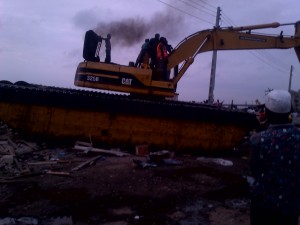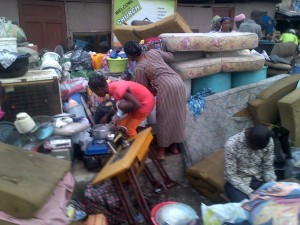Friends of Badia East from across the civil society have come together to strongly condemn the forced evictions that began in Badia East, Lagos State, on 18 September 2015. Once again, thousands of families have been rendered homeless at the peak of torrential rainfall, leaving scores of women and children to sleep under makeshift shelters at the demolition site. The heavy rains that fell throughout the Eid-el-Kabir (Sallah) holiday highlighted the misery of homelessness.
As evening fell on the Sallah holiday, two young women each holding young babies huddled under a tarpaulin shelter as the rain fell. One of them, Mrs. Olabisi Malomo bounced her crying baby on her knee as she recounted what happened, “I stay here, I make 25 years at this railway line. When they want demolish our house, they just come without information, say they want demolish. One night we just see caterpillar (bulldozer). Some people say they want do gutter. It no reach four hours when all them police and people who do demolition come. They say we should begin to pack our load. It no reach 30 minutes before they begin demolish everywhere.”
Since the demolition, Olabisi Malomo has been sleeping in a makeshift shelter with her six children, her elderly mother, her sister and neighbors and their children. Before the demolition, she worked as a petty trader, but all her goods were lost in the demolition. “I am sleeping outside with my six children. As rain is falling now, we are under the rain. The way they do us for this community, it’s not good. In this Nigeria, they treat we poor people like we’re goats. We aren’t goats; we are human beings. They should help us. We have suffered too much.”
Based on the lack of adequate notice, the failure to identify and consult with the persons to be affected, and the total disregard for persons who are left homeless without alternative as a result of the ongoing demolition, we consider the demolitions carried out to be a forced eviction and, as such, a grave violation of human rights law and statutory provisions in force in Nigeria. We note that, without the requisite protections being put in place, even an eviction carried out in accordance with a judicial decision can amount to a forced eviction, according to the United Nations Office of the High Commissioner for Human Rights and UN Habitat, among others.
The forced eviction started on 18-19 September and continued again on 22 September, moving from Badia East toward Badia West, displacing more than 10,000 people to date. Although technically a private demolition exercise by the traditional landowners, the Ojora Chieftaincy Family, the Nigerian Police Force and Lagos State Government have been providing material support throughout the exercise. Scores of policemen have been on ground every day, with a police officer seen riding on the bulldozer itself. On Tuesday, a well-known official with the Lagos State Physical Planning and Development Authority (LSPPDA), Mr. Tunde Olugbewesa, was on ground throughout the day with other officials, overseeing and directing the demolition.
In February 2013, over 9,000 people were forcibly evicted from the neighboring part of Badia East in a demolition carried out by the Lagos State Government to make way for a housing project built under the Home Ownership Mortgage Scheme (HOMS). That demolition violated the World Bank safeguard policies on involuntary resettlement, which the State Government committed to follow when it accepted $200 million to upgrade Badia and other slums in Lagos – financing intended to benefit the residents of Badia.
There is serious concern that the Lagos State Government will use the land now being cleared to expand its HOMS housing scheme, in which the monthly mortgage payment for the least expensive housing unit is more than ten times the typical rent for comparable space in Badia.
On Monday, 21 September, Badia East evictees staged a peaceful protest outside the Lagos State Governor’s office, calling for Governor Ambode to intervene to stop the demolition. In response, the Lagos State Government issued a temporary stoppage order late on Tuesday.
While we applaud the stoppage of the demolition since Tuesday evening, we remain deeply concerned about the thousands of evictees who have suddenly been rendered homeless, as well as the 20,000 or more others in Badia East, Badia West, Apataaro, and other neighboring areas of Apapa LGA / Apapa-Iganmu LCDA who are still at risk should the demolitions resume.
The demolition has not only caused widespread homelessness, but also severe loss of livelihood for traders, landlords, and business owners alike. Mrs. Biola Idiefo Ogunyemi, a widow and mother of six, lost two residential buildings with a total of 38 rooms, three shops, and a bar that she had owned since 1991. The 14-room makeshift structure that she erected behind these buildings was also destroyed. “How will I care for myself and my children now?” she lamented.
A young mother of two, Abimbola Joshua, spoke as evening fell on the Sallah holiday from inside her makeshift tent, surrounded by children escaping the rain: “The way the King Ojora Fatai treats us is very bad, he treats us as slaves. I want Fatai Ojora to know that, anything he is doing on this earth, he should remember God. Because when we finish everything on this earth, we go to God. And God will judge everyone according to his or her behavior on earth.”
An elderly woman with only one good leg, using a single zinc sheet to cover her and a mother nursing a 1.5-month-old baby next to her from the rain, pleaded: “Make the Government help us beg Aromire Fatai to leave us alone. Make him forgive us. We have suffered too much.”
We join the victims in calling for the Ojora Chieftaincy Family and the Lagos State Government put a final halt to these demolitions. We implore urgent protective action for the victims by the Lagos State Government and the Federal Government, both of which have the legal responsibility of preventing forced evictions, protecting victims, and ensuring effective remedy.
At a United Nations summit just days ago, President Buhari publicly committed Nigeria to the 2030 Sustainable Development Agenda, which sets goals for eradication of poverty and rights-based upgrading of slums. It is high time for such commitments to be felt in places like Badia.
To realize such legal obligations and political commitments, we specifically demand:
1. That the Federal Government of Nigerian and the Lagos State Government take all necessary steps to ensure there are no further forced evictions;
2. That people already forcibly evicted be returned to their rebuilt homes, or provided an adequate and satisfactory alternative, and compensated for all their losses; and
3. That persons rendered homeless, especially women, children and other vulnerable populations, be given immediate humanitarian assistance, including adequate temporary shelter while long-term solutions are in process.
SIGNED BY FRIENDS OF BADIA EAST:
- Spaces for Change (S4C), www.spacesforchange.org
- Justice & Empowerment Initiatives (JEI), www.justempower.org
- Nigerian Slum/Informal Settlement Federation, www.facebook.com/NigerianFederation.net
- Center for Advancement of Development Rights, (CEADER), www.ceader.org
- Centre for Defense of Human Rights & Democracy In Africa, www.cdhrda.org
- CEE-HOPE Nigeria, ceehopeng.blogspot.com
- White Code Centre, whitecodecentre.org
- Global Rights Nigeria, www.globalrights.org
- White Code Centre, whitecodecentre.org
- Media Concern Initiative for Women and Children
- Network on Police Reform in Nigeria (NOPRIN), www.noprin.org
- Development Innovation Matters
- Rural & Urban Development Initiative (RUDI)
- Ore Disu
- Olamide Udo-Udoma
- Nseabasi Effiong Umoh
- ‘Toyin Elegbede-Gbadegesin
- Steve Aborishade






















